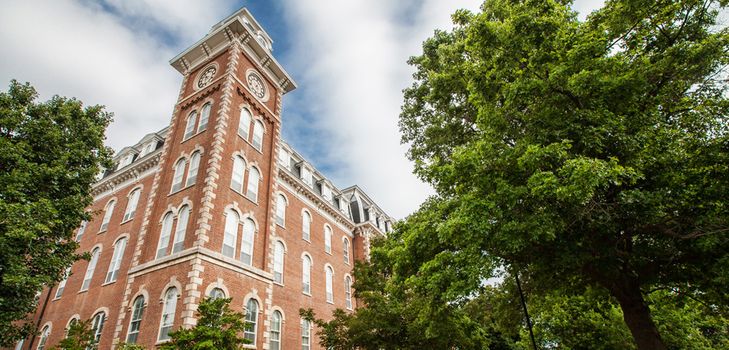University of Arkansas in Fayetteville delivers $2.2 billion economic boon to state’s economy, report says
by February 20, 2019 8:46 pm 1,259 views

Photo courtesy of the University of Arkansas.
The University of Arkansas in Fayetteville made a $2.2 billion splash on the state’s economy in 2018 and has more than tripled its benefit to Arkansas over almost the past decade, according to a new report released Wednesday (Feb. 20) by the university’s own business school.
“The UofA stimulates the economy in many ways through our operations, our graduates and our work to improve lives through education, research and discovery, and service to Arkansas,” said Chancellor Joe Steinmetz. “We are proud to be Arkansas’ flagship and I am excited to see the impact of our mission continue to grow.”
According to the 91-page report prepared by the Center for Business and Economic Research in the Sam M. Walton College of Business, the UA campus in Fayetteville has delivered an outsized impact on Arkansas growth by fulfilling its land-grant mission of developing human capital, growing ideas, and transmitting knowledge to the public.
In 2018, the UA’s economic impact grew to $2.2 billion, more than tripling from $725 million in 2009. The new 2018 study, released at the State Chamber of Commerce offices in Little Rock, provides an updated view of the effects of the university on the state and region following similar studies in 2010 and 2014.
The report’s findings show that a significant portion of the university’s expenditures goes toward payroll for the faculty and staff employed by the institution. In fiscal year 2018, payroll expenditures were nearly $419.3 million, or 31.1% of the total annual spending.
Most of the annual payroll spending occurred in Northwest Arkansas, which already has the state’s strongest annual gross domestic product and payroll growth, and it accounts for most of the state’s population spike.
On top of the university’s payroll growth, expenditures for facilities equaled $497.1 million or 36.9% of the total spending. One-time construction spending of $465.4 million accounted for most of the expenditures on facilities in the 2018 fiscal year. About 91.2% of the spending on facilities remained in Arkansas and 12.1% remained in Northwest Arkansas, officials said.
The state’s flagship university also spent $261.4 million, or 19.4% of the total, on services that included marketing, professional services, honoraria, computer services, auto repairs, event security, consulting services, library-related services, equipment leases, and the like. A total of $31.4 million, or 12% of that amount, stayed in Arkansas and $10.7 million, or 4.1%, in Northwest Arkansas.
Overall, wholesale and retail purchases accounted for 10.1% of total university spending. These purchases included food and beverages, equipment, office supplies, health and lab supplies, agricultural supplies, and more. About 29% of wholesale and retail expenditures were made in Arkansas and 20.7% in Northwest Arkansas, where the University of Arkansas-Fayetteville campus is located.
“The UofA works every day to build our state through opportunity,” said Stacy Leeds, vice chancellor for economic development. “We work with industry to find solutions, efficiencies and to develop new technology. We graduate students who feed the economy as leaders in the workforce and we grow entrepreneurs who build new companies that create more jobs for Arkansas.”
The report further concluded that state and federal funding that supports the university is used to produce outcomes that exceed the costs. For example, the report shows that in 2018, the $166.8 million in state appropriations to the UofA were leveraged 13.56 times — for each dollar of state funding, the university pumps $13.56 back into the state economy.
University operations and associated economic activities contributed more than $89.5 million in state and local taxes through income taxes, business taxes, property taxes and other related taxes. Additionally, student spending contributed $453.5 million to the economy.
Statewide, the Fayetteville campus has produced 77,183 alumni in Arkansas, earning $2.7 billion in wages. Those alumni paid $130 million in state income taxes, $65 million in state sales taxes and $12 million in county sales taxes. More than 82% of the 2018 graduating class had jobs or were accepted to graduate school and their average starting salary was $51,997.
Among other findings in the report, the U of A’s research expenditures, entrepreneurial and technology transfer programs also grew, improving lives through the discovery and creating new jobs through business growth and commercialization of new products, officials said. In 2017, the UA’s Fayetteville campus received 54 invention disclosures and patented 13 new discoveries.
Other key findings in the report include:
- The university’s economic activity of $2.2 billion includes $1.5 billion in recurring operational impacts and $714.4 million in one-time construction impacts.
- Direct expenditures of $948.1 million within Arkansas by the university had an economic output multiplier of 2.39 in 2018.
- In 2018, the university earned over $90 million in research awards. This represents a 4.8% increase over the previous year and a 33.8% increase over 10 years.
- Research expenditures at the University of Arkansas were at a record $175 million in 2018, up 10.5% from 2017 and 51.7% from 2010.
- In 2017, the University received 54 invention disclosures, filed 8 new patent applications, and received 13 patent issues.
University of Arkansas economist Mervin Jebaraj, director of the Center for Business and Economic Research, led the development of the report. To view the summary and complete report, click here.
